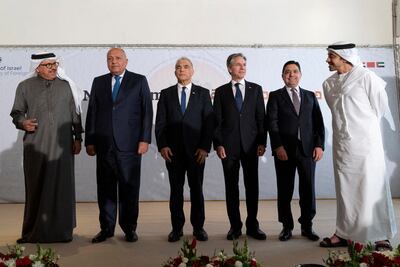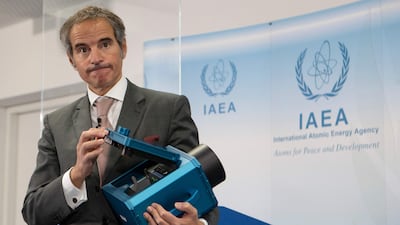Iran is taking an increasingly hardline stance against the UN nuclear watchdog and the US as it steps up its enrichment programme despite growing concerns it is hiding some nuclear facilities.
Comments from senior Iranian officials on Monday directed at the International Atomic Energy Agency's position illustrate the growing gap between the sides despite months of negotiations over a return to the 2015 agreement with global powers to limit nuclear enrichment.
Iranian opposition and human rights activists also accused Tehran of corruption, mismanagement of public money and using state funds to bankroll proxy armed groups across the region at a time when people struggle to cope with a financial crisis.
Iranians face rising inflation and the plummeting value of the national currency. There have been protests against rises in fuel prices and increasing unemployment, according to the World Bank.
However, the government in Tehran remains defiant and has insisted that the economy is resilient in the face of heavy US sanctions linked to the country's nuclear programme and support for terrorist groups.
On Monday, the Foreign Ministry criticised IAEA director general Rafael Grossi after he said the only way for Iran to rebuild trust with the international community and get a deal to lift sanctions was to let UN inspectors back into nuclear sites to assess the situation.
“He should review [his behaviour] and be careful not to talk about one of the extremely important members of the IAEA with non-technical language. This is beyond his mandate,” said Saeed Khatibzadeh, the spokesman for the Iranian Foreign Ministry.
Mr Grossi told CNN on Sunday that Iran needed to allow inspectors into nuclear sites.
According to the IAEA, Iran removed 27 surveillance cameras from nuclear facilities across the country last week, as the watchdog’s 35-nation board overwhelmingly passed a resolution criticising Tehran for undeclared nuclear activities.
Mr Grossi told reporters in Vienna on Friday that this could deal a “fatal blow” to the stalled talks to revive a 2015 nuclear deal as Tehran enriches uranium closer to weapons-grade levels.
The administration of US president Donald Trump left the deal in 2018 and reimposed more sanctions on Iran.
“This, of course, poses a serious challenge to our ability to continue working there,” Mr Grossi said.
Iran has always insisted its nuclear programme is peaceful despite admitting to enriching uranium close to weapons grade and far beyond the level needed for power, medical or industrial use.
At the World Economic Forum in Davos last month, Iranian Foreign Minister Hossein Amirabdollahian hit out at the incumbent US administration and criticised it for keeping up with the “maximum pressure” policy adopted by Mr Trump.
He also dismissed reports about his country’s hidden nuclear work as “lies fabricated” by Israel.
A recent IAEA report following an investigation into unexplained nuclear material found at three undeclared sites in Iran said that the government “has not provided explanations that are technically credible in relation to the agency's findings at those locations,” according to Reuters.
Despite this, Iran continues to accuse the West and the UN of biased negotiation.
“We are for a strong, lasting and good deal and we are committed to it. But there must be a realistic approach to finalise it. The US side has to make the decision and the ball is in their court,” Mr Amirabdollahian said.
Reshaping the geopolitics of the region
The nuclear standoff comes as several countries in the region have moved to reshape alliances over recent weeks to confront the threat Tehran and its proxies in Yemen, Syria, Lebanon and Iraq pose.
Israeli Defence Minister Benny Gantz on Tuesday called for countries that share a concern about Iran to work together to strengthen their military position under US aegis as President Joe Biden plans a visit to the Gulf in the coming weeks.
“In the face of Iranian belligerence … what is needed is not just co-operation, but also a regional force build-up, with American leadership, which would strengthen all parties involved,” he said, according to an official transcript.
In March, Israel hosted a summit that brought together senior diplomats from the UAE, the US, Israel, Egypt, Morocco and Bahrain.
Israeli officials told local media at the time that the unprecedented gathering was primarily aimed at creating a “regional security architecture.”
The landmark Abraham Accords between Israel, the UAE and Bahrain and followed by agreements between Israel and Morocco and Sudan have paved the way for such direct meetings on issues of regional concern.
US Secretary of State Antony Blinken said that with the agreements, “once-impossible things have become possible”.
The Accords, signed at the White House in 2020, were Israel's first normalisation of ties with an Arab country since Egypt signed a peace agreement with Israel in 1979 and Jordan became the second Arab country to sign a peace accord with Israel in 1994.

Michael A Horowitz, head of intelligence at the Bahrain-based Le Beck International, the Middle East and North Africa security consultancy group, said that there is a real effort to better integrate defences to protect against some of the common threats posed by Iranian proxies.
There are growing concerns about Iran’s arsenal of ballistic missiles and the armed drones used by the Iran-aligned Houthi movement in Yemen that have been used against Saudi Arabia and Abu Dhabi, the UAE's capital.
But Mr Horowitz also points to Iran's outreach to Gulf neighbours for talks separate from international dialogue over sanctions.
“In general, Iran has also been aware that it is Israel's ‘best salesman’ in the Gulf, which partly explains why Iranian President [Ebrahim] Raisi engaged in an effort to restore some of the ties between Iran and the Gulf — with limited success so far,” Mr Horowitz told The National.
Meanwhile, the animosity between Iran and Israel — which staunchly opposes the nuclear deal — has heightened in recent weeks after Iran accused Israel on Monday of assassinating two members of its Islamic Revolutionary Guard Corps in separate incidents at the weekend. The IRGC is designated as a terrorist group by the US and several other states.
Tehran has blamed Israel of carrying out several assassinations of high-ranking officers and military scientists in the country and abroad. Israel has made no comment on the accusations.
One of the most high-profile was the 2020 killing of Iran’s leading military nuclear scientist, Mohsen Fakhrizadeh.
He was killed by a remote-controlled machinegun while travelling in a car outside Tehran.
Iran has said it will avenge the killings.
In March, Iranian state media said that Tehran launched a dozen ballistic missiles on what it called “Israeli targets” in the Iraqi city of Erbil in the northern Kurdistan region.


